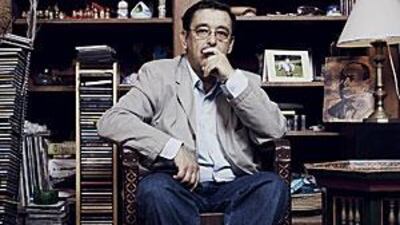RABAT // One afternoon 44 years ago this month, the exiled Moroccan opposition leader Mehdi Ben Barka was invited into an unmarked car outside the Brasserie Lipp, in Paris, and has never been heard from since. Two weeks ago France issued international arrest warrants via Interpol for four senior Moroccan security officials wanted in connection with Ben Barka's 1965 kidnapping by French agents, only to suspend them a day later.
For decades, the stop-and-go investigation of L'Affaire Ben Barka has complicated France's relations with its former colony, Morocco, a key trading partner and Arab ally. Ben Barka's family say the countries stalled for political reasons, while his old allies struggle to keep alive his fading memory. "The decision was the most cynical that we've seen in 44 years," said Ben Barka's son, Bachir, who lives today in the French town of Belfort, near the German border. "Reasons of state are preventing the justice ministry from doing its work."
French justice ministry officials have denied that the warrants' suspension was politically motivated, citing a request by Interpol for more information. Morocco has not responded officially and its communication minister, Khalid Naciri, said he could not comment on the warrants. Morocco's justice ministry could not be reached for comment. Born in Rabat, the Moroccan capital, Ben Barka served as a teacher to Crown Prince Hassan before founding the socialist National Union of Popular Forces party. By 1963, his former pupil had become King Hassan II, a stern ruler whose crackdown on Morocco's leftist opposition compelled Ben Barka to flee the country.
Several restless years introduced him to left-wing superstars including Che Guevera and Malcolm X. Settled in Switzerland, Ben Barka was organising an international conference when a false invitation to make a documentary film lured him to Paris on October 29 1965. The abduction infuriated French president Charles de Gaulle, who claimed ignorance of the alleged involvement of French secret agents, and galvanised a generation of young Moroccans into political activism.
"The students were outraged," said Abdelhamid Amine, vice president of the Moroccan Association of Human Rights (AMDH), who arrived in Paris in autumn of 1965 to study agronomy. "Personally, the kidnap was the start of my politicisation as a member of the Moroccan left." In 1967, two French agents were imprisoned for Ben Barka's abduction. However, French investigators believed that the scheme's mastermind was the Moroccan interior minister, Mohamed Oufkir, who avoided trial until allegedly killing himself in 1972 after a failed coup.
With Ben Barka widely presumed murdered, speculation has shifted to the fate of his body, which has never been found. One story has Ben Barka buried on an island in the Seine. Another tells that his body was taken to Morocco and dissolved in acid. According to a third, it was encased in cement and buried near Paris - save the head, carried back to Morocco by Oufkir in a suitcase. This month Georges Fleury, a writer and former French navy commando told France's Le Journal du Dimanche newspaper that he had police documents indicating that Ben Barka's body may have been incinerated near Paris.
Morocco turned a corner in 1999 with the death of Hassan II and the accession of his reform-minded son, King Mohamed VI, who established a truth commission to look into alleged human rights abuses during his father's reign. A new report including information about Ben Barka is slated for release in the coming weeks, said Ahmed Herzenni, president of the Consultative Council on Human Rights, a royal advisory body that oversees the truth commission.
Meanwhile, France's investigation has oozed along. The warrants suspended from going international this month first appeared as French warrants in 2007, targeting officials including the head of Morocco's gendarmerie, Hosni Benslimane. "These are all very senior people," said Michael Willis, professor of Moroccan and Mediterranean Studies at Oxford University's Centre for Middle East Studies. "This could create friction if the French decide to push it."
For Bachir Ben Barka, France should do so. Given the officials' high positions in Morocco's security services, "they must have been privy to part of the truth we're seeking," he said. In Morocco, Ben Barka remains an emblematic figure evoked by political allies and human rights activists such as Abdelhamid Amine of the AMDH, who mark each 29 October with a national human rights day. "He symbolised something that Moroccans dream of, which is hope," said Ahmed Benchemsi, director of the leading magazines TelQuel and Nichane. However, were it not for the mystique of Ben Barka's unsolved disappearance, "we would have forgotten him long ago."
That process was on display recently at a café in Agdal, an upscale Rabat neighbourhood popular with students at the nearby Mohamed V University. "I don't think we'll ever know what happened to Ben Barka," said Amina Ghallab, 44, a nurse sharing a coffee with her daughter, Kaoutar Ibn Rezzour, 24, an economics student. "For my generation it's still important - not for my daughter, though." Miss Rezzour's priorities are simple: a diploma, then a job. "Ben Barka? I know the name, but the affair doesn't have bearing on my life. It happened long ago."
jthorne@thenational.ae

